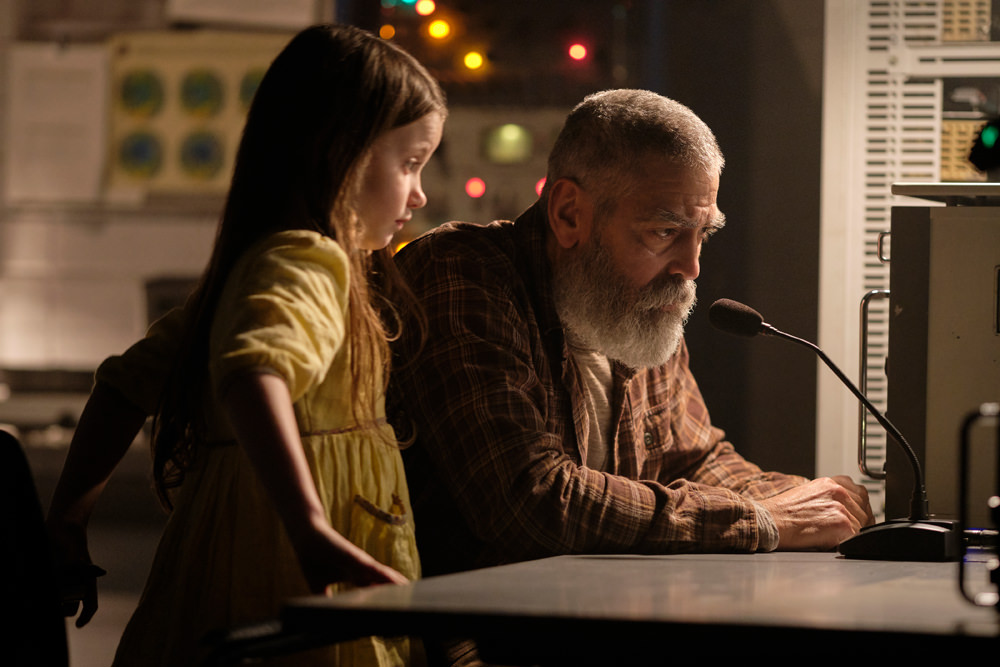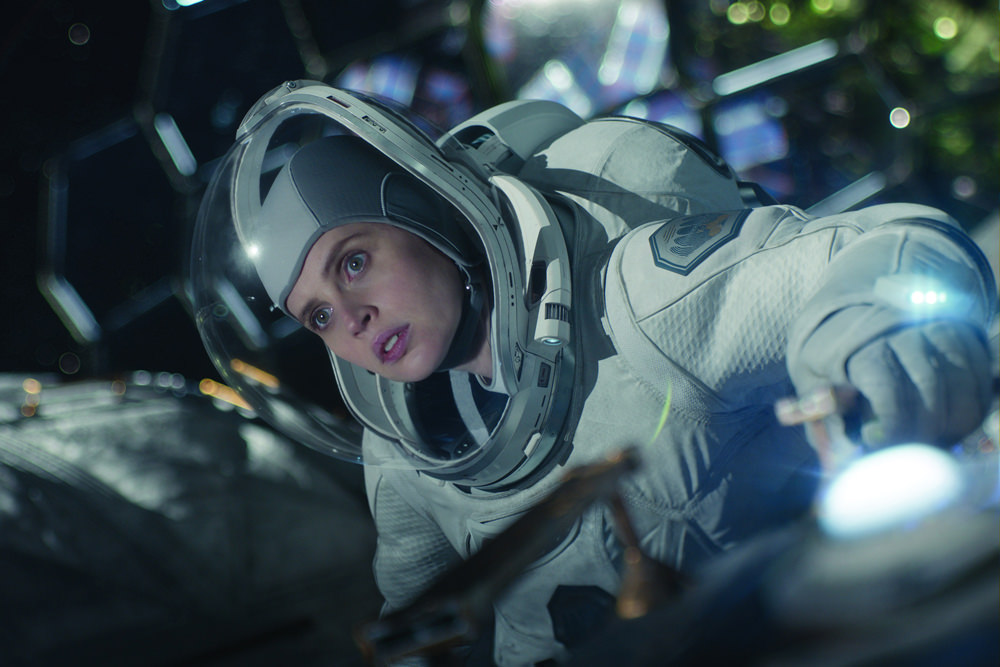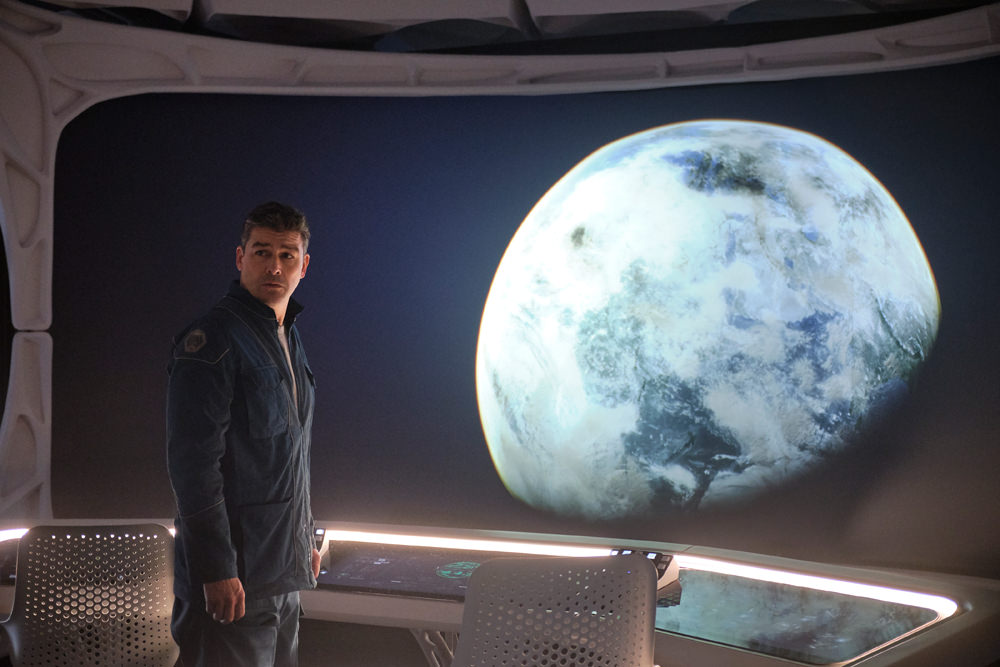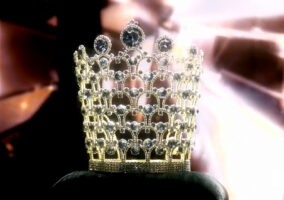
George Clooney returns to the director’s chair for The Midnight Sky, a big swing of a film in which he also stars, giving a delicately melancholy performance of an old man at the end of things, trying to make one last good act count for something.
Directed by Clooney from an adaptation of Lily Brooks-Dalton’s 2016 novel Good Morning, Midnight by screenwriter Mark L. Smith, The Midnight Sky may just be a Rorschach test of a film. How you feel about it may come down to how you’re doing as 2020 winds down; what kind of capacity you have at such a difficult time for relentless despair or borderline maudlin sentimentality. The story, set in what sounds like the far-flung year of 2049 (until you remember we’re closer to that year than we are to 1990), is more complex than you might expect going into it. On the surface, it’s a classic apocalypse story in many ways, complete with sketchy, incomplete information about what exactly happened three weeks prior to the start of the film during some sort of ecological or radiation-based worldwide disaster referred to only in passing as “The Event.” There are opening scenes of people staring intently at screens while listening to reports and scenes of people fleeing on helicopters to safe areas that sound very much like stopgaps against the inevitable, but virtually all of the background information is kept vague, including a series of flashbacks in which Ethan Peck stands in for a young Clooney, very distractingly dubbed by the current Clooney. It is also, in many ways another iteration of what has become one of the more persistent film tropes of the last decade or so, the “Sad Astronaut” tale, as the other half of the story takes place out in deep space, on a ship returning to Earth with after its crew confirmed the existence of a nearby (relatively speaking) inhabitable planet. The crew (David Oyelowo, Felicity Jones, Demián Bechir, Kyle Chandler, Tiffany Boone) are a likeable, if barely sketched bunch who sing “Sweet Caroline” while doing routine ship maintenance and also love their families and friends. This is, unfortunately, the entirety of what we learn about most of them, which becomes a problem when tragedy strikes and some of the crew make choices that are hard to explain outside of reiterating “they love their families and friends.” You might think they’re not central to the story, but the film is neatly split in terms of its focus, giving both the earthbound tale and the space-faring one equal weight as we wait and hope for them to converge.

Thanks to cinematographer Martin Ruhe and no small amount of stunning visual effect work, it’s an absolutely beautiful film to behold. We have no doubt that several of the shots would have elicited gasps in a theater audience, watching them displayed on a massive screen. Composer Alexandre Desplat gives the film a lush, elegiac, prestige-film soundtrack that’s both beautiful and occasionally just a tad overwrought for certain scenes, sometimes working against the sense of desolation and despair that the film is trying to convey. This push-pull of despair and sentiment are what define the film and as noted, how you feel about it is going to come down to how much you’re willing to accept these two tones fighting for your attention.
There are two “action” (for lack of a better word) set pieces; one in space and one in the arctic cold of earth. While technically excellent and even beautiful sequences, as storytelling devices, they serve as mere escalations of misery and hopelessness to the point of near farce. Some of what befalls Clooney’s character on his frozen trek would not seem out of place in a Buster Keaton slapstick from a century ago, but it’s played utterly, deadly serious. And a tragedy in space is compounded to an almost ludicrous level by certain staging and directorial choices about how to depict it. There are a bunch of points where the tone seems completely off, given what all the characters are dealing with. People react to the news of the apocalypse with a calm that deflates the tension in the entire film. And while we wouldn’t rank this all that high on the list of critical issues, there comes a point when certain practical considerations, such as how much a human body can withstand arctic cold conditions or the idea of preserving humanity from an impossibly small gene pool ,tend to hang heavily over the film, unaddressed and unanswered.
“Show don’t tell” is one of those aphorisms about writing that sounds universally correct, but is actually fairly limited and limiting advice. After all, you don’t show a story, you tell one; even in a visual medium like film. And while Clooney is clearly highly adept at using the medium and language of filmmaking to show you wondrous, beautiful and terrifying things, and is also an accomplished actor who can make you feel the tension and anxiety that comes just before all hope is lost, beautiful shots and tender performances aren’t enough to truly get this film off the ground.

It’s a stunningly beautiful film to look at and listen to, with several minutely detailed and delicately crafted performances, but it’s dour and morose. A seriousness of tone wouldn’t necessarily be a flaw for any apocalypse film, but without giving any details, at the last minute – almost literally – Clooney tries to put a Band-Aid of almost shameless sentimentality on the story that renders a good deal of it in a far less interesting light in retrospect. We did not respond well to it, not least because the characterization of everyone involved was too shallow for us to truly become invested. But every inch and moment of the film fairly drips with prestige and artistry, even if the whole never quite pulls together.
Meet the Queens of “RuPaul’s Drag Race” Season 13! Next Post:
Carolina Herrera Pre-Fall 2021 Collection
Please review our Community Guidelines before posting a comment. Thank you!



